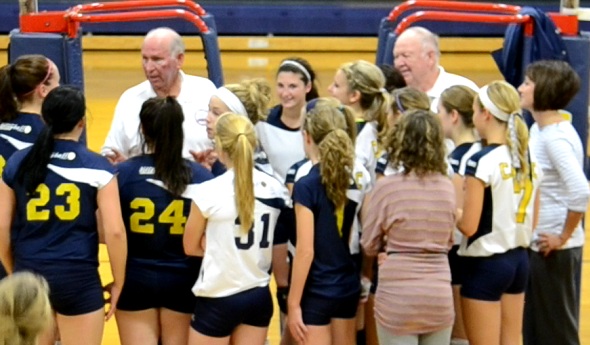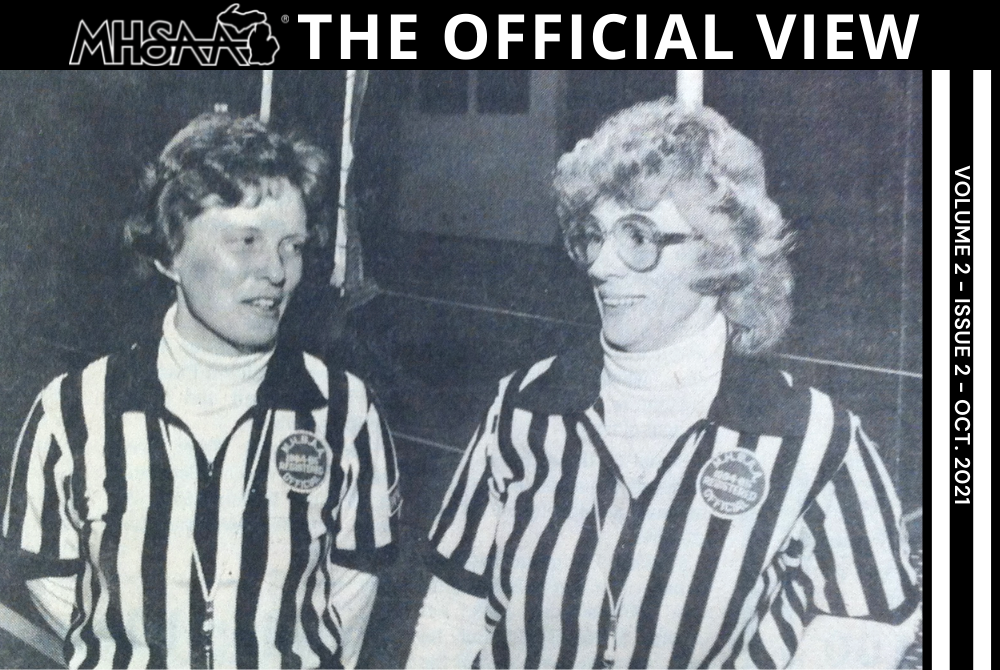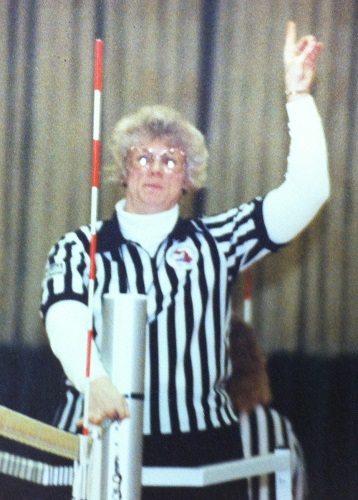
90 Years of Making the Right Calls
November 7, 2012
By Geoff Kimmerly
Second Half editor
Beryl Hager read something about officiating recently that struck him.
People will never forget a bad call, and they’ll never remember a good one.
“That’s the way it is,” the longtime official from Marlette said. “Realistically, everyone makes a bad call.”
But the calls, good and bad, are not what Hager and longtime partner Vern Geister will remember most from their combined 90 years in Michigan high school athletics, which "tentatively" came to an end this fall.
The former high school classmates have a standing dinner double date with their wives. When that time comes, they’ll each celebrate more than four decades as MHSAA officials, including many years working side-by-side on the football field and most recently the volleyball court.
Hager, 74, has been an official since 1967 – a stretch of 46 years. Geister, 81, served his 44th this fall.
Frequently working five days a week over the decades, they've facilitated hundreds of games and benefited thousands of athletes, mostly in the Thumb area. They've officiated Capac’s volleyball invitational over the tenures of three athletic directors. Hager worked basketball games in the school’s Harry C. Moore Gymnasium when Moore was the basketball coach – Moore died in 1986.
“They have just great attitudes. They’re always wonderful with our kids,” Capac athletic director Arnie VandeMark said. “And you just wouldn't believe the stories they told us. They've been here a long time.”
A book full of memories
Hager wishes he’d kept a diary of his officiating career, which began in 1967.
Some of his most vivid memories are perhaps not what you’d expect.
“I saw some dreadful injuries,” he said. “I saw a young man break a thigh bone, and he was in shock and didn't feel any pain. One night at a volleyball match, a girl broke her ankle, came down on somebody’s foot. One night at a basketball game, two guys were playing and one jumped up and the other was behind him, trailing him, and four teeth went flying through the air. The front one came down on his back, the other came down on his face. Both were out.”
But the far greater number of his football, basketball, volleyball and baseball games were without incident – just as an official would have them.
Hager always enjoyed sports. He was involved in Little League baseball and has taught Sunday school at his church for 55 years. Officiating seemed a great way to blend his enjoyment of sports and people.
Plus it worked into his schedule. He could pick up games that didn't conflict with his jobs in farming and later facility maintenance. His son graduated in 1983, and aside from one half of one football game, he didn't miss an event. For a short while at the start, Hager's his wife Lois officiated with him.
He also was among pioneers in one of his sports, officiating volleyball from its MHSAA start in 1976. He’s worked a number of District tournaments and a handful of Regionals over the years – and like many things over 45 seasons, watched that sport come a long way.
“I didn't know anything about it. Nor did anyone else,” Hager said. “It’s changed tremendously in the last 35 years. When we started, if they could get the ball over the net, and hit it back, we were doing really well. Now, one guys told me volleyball is not a game. It’s a science.”
A natural fit
Geister really wanted to coach.
He’d done so for his son’s little league baseball team for five years, but knew his chances to continue were few. At that point in time during the 1950s, nearly all coaches also were teachers.
Before retiring in 1997, Geister worked first in the mobile home industry, then for the Kroger company before serving for more than 16 years as a Sanilac County magistrate. Officiating seemed like the next best way to stay involved with athletics.
“It was kind of a natural thing to get started,” he said.
“I think it makes you feel younger than you really are, just being with the athletes.”
Geister, who had caught for the Marlette baseball team before graduating in 1949, began officiating that sport before picking up football, basketball, softball and eventually volleyball. He got heaviest into that last after a knee replacement in 1997 made it difficult to keep up on the football field and basketball court.
But he did have a chance to officiate at the highest high school level, working the 1983 Class D Football Final at the Pontiac Silverdome between St. Ignace and Mendon. Geister also officiated Semifinals and some high-level baseball playoffs.
One football Regional sticks out most. Elkton-Pigeon-Bay Port and now-closed Detroit DePorres matched up at Flint’s Atwood Stadium. A storm had come through and dropped a good amount of snow. That was cleared, but a sheet of ice was left behind.
Back then, four people made up an officiating crew – now it is five – which would've made keeping up with the players pretty tough. The good news, perhaps, was that the players had a hard time keeping upright on the slippery turf as well.
Remembering a third partner
Geister said for him, the best part of officiating has been the friends he’s had the opportunity to make and maintain over the years.
They'll always remember a third partner who died in 1978.
Classmate Andy McSkulin had been a freshman at Marlette when Geister was a senior in 1948-49 and a senior when Hager was a freshman. He became an MHSAA official around the same time those two started up.
The three did a number of games together and worked on the same football crew at times. They knew each other well before, but got to know each other even better.
Hager has never gotten riled easily, and gave out only a few technical fouls over the years. But he remembered working a basketball game with McSkulin during which his partner knew Hager was about to assess one – McSkulin “said he could see the fire in my eyes.”
More to come?
For the last 15 seasons, Hager and Geister have worked volleyball matches together. They bring a professional but fun atmosphere to their games.
They’re known for joking with each other. They've never had an argument.
And although Geister doesn't completely agree, Hager said he and his partner’s retirement is only tentative. They've discussed coming back for a few junior varsity or junior high games next fall.
Neither belongs to a local officials association or has a computer. But both have still gotten calls from local athletic directors like VandeMark, who appreciate their knowledge and approach in working their games.
“I think what you enjoy is having the respect of the players and coaches,” Geister said. “I think you get to the point where it’s the pride of feeling you've done your best, done a good job and that they appreciate it.”
PHOTO: Officials Beryl Hager (left) and Vern Geister are congratulated by members of the Capac freshman, junior varsity and varsity volleyball teams while being honored for their combined 90 years of service during a match last month. (Photo courtesy of Capac athletics.)

The Official View: Title IX – Door Opens for Female Officials
By
Brent Rice
MHSAA Assistant Director
October 29, 2021
In the 50 years since Congress passed Title IX legislation in order to create equal educational opportunities, huge strides have been made for female students to participate in athletics.
But the advancement of opportunities wasn’t just for the athletes. It also opened a door which ushered in a generation of female sports officials.
Betty Near is one of those officials whose long and distinguished career as a high school and collegiate volleyball official is a direct result of the opportunities provided through Title IX. Unlike many today who entered officiating after having played the sport, Betty didn’t have those opportunities before first climbing the ladder (literally) in 1971. She was encouraged to take up the sport by Macia Tiesenga (a nationally-ranked collegiate official) who told Betty – who had been involved in athletics recreationally – that athletes make the best officials because of their understanding of competition.
“I’m frequently asked whether I got into officiating because I played volleyball. I tell them I didn’t play because girls volleyball didn’t exist when I was in school," Near said. "I try to share the story of Title IX every chance I get, to show them that they now have opportunities to both play and officiate because of those that came before them.”
Near has spent more than 45 years as a registered MHSAA official and is still going strong. That run has included six appearances as a Finals official. She recalls how at one of those Finals, an injury to her knee created a change in mechanics for the entire state.
“When I first began officiating in the 70s, the MHSAA had the umpires (R2s today) kneel underneath the net to look at blockers," she said. "This was quite dangerous and pretty ineffective.
"Officiating at the collegiate level, I had been trained to stand at the pole and look down the net. With this background, and seeing as my knee was still hurting from an earlier injury, I decided to use this mechanic.”
 Sue Martin, the MHSAA director for volleyball at the time, approached Betty following her match. Near was certain that she was going to receive an earful. Instead, Martin asked the justification for using the mechanic, and they discussed the pros and cons of each. It was ultimately decided moving forward the umpire would take a position standing at the pole.
Sue Martin, the MHSAA director for volleyball at the time, approached Betty following her match. Near was certain that she was going to receive an earful. Instead, Martin asked the justification for using the mechanic, and they discussed the pros and cons of each. It was ultimately decided moving forward the umpire would take a position standing at the pole.
Mechanics changes aren’t the only effect Near has had on the sport. She was instrumental in the start of the West Michigan Volleyball Officials Association in 1984 and continues to help lead and grow that organization (now with more than 125 members). This has allowed her to work with the community, raising nearly $125,000 for scholarships for graduating high school seniors. And one of her biggest contributions remains her role in recruiting and mentoring new officials – especially helping to develop the next generation of female officials.
“Mentoring is a gratifying thing,” said Near, “especially when I receive emails or calls thanking me for helping them understand specific rules or situations and improving their skill sets. Watching someone I have mentored over 20 years work her way up to officiate multiple state tournaments (pleases me).”
Now officiating primarily at the college level, Betty still reserves Thursdays during the season to officiate MHSAA contests. She does this for the purpose of staying connected to high school students and officials and to build on the growth of female registered officials, though she also recognizes that challenges remain for female officials advancing through the system.
One of the natural barriers that apply to women more often than men is that women who begin families sometimes find difficulties continuing to officiate with their other responsibilities. While home lives can be difficult to navigate (for both women and men), officiating school sports provides a flexible alternative to stay active, remain involved in athletics, give back to the community, develop camaraderie and earn some extra cash.
Another hurdle that Near identifies for female officials, unfortunately, is a continuation of the “good ol' boy network.” She is reminded of a not-so-distant-past example when she and another female official had been selected to officiate the Regional round of the MHSAA Tournament; and even though both were well-established collegiate officials the host athletic director insisted that less-experienced male officials work as the R1 and R2 and the women work as line judges because the men would have better control of the tough matchup.
Of course, that kind of mindset isn’t based in fact, and many of the MHSAA’s best officials in all sports are women. Especially in girls sports, it is important that the student athletes see officials who represent them; but the MHSAA seeks female officials in all sports, including those dominated by male participants. This year will once again include a female officiating in the MHSAA Football Finals. Female officials also have worked Finals in baseball, boys basketball, ice hockey and wrestling.
The door that was opened for women and girls with the passing of Title IX a half-century ago only provides the opportunity. Capitalizing still requires stepping through the door to take full advantage of the opportunities provided. Near wants to encourage anyone to join the avocation of officiating, but especially young women.
“My hook is that the officiating is fun, and it is an activity that can be an avocation that can pay (in many ways) throughout their lifetimes," she said.
It’s Official!
Postseason Assignments: Officials assignments for fall sports tournaments have been released. Congratulations to all selected to officiate this year.
Speaking of tournament assignments, a change will be made this year that allows basketball officials to submit their availability to work together as a crew. Crews can be set for the boys and girls tournaments separately. The hope is that this will encourage more officials to seek postseason consideration, knowing they can choose with whom they will officiate. Eligible individuals not included with a crew will be assigned a crew by MHSAA staff.
For all winter sports officials, make sure to complete all requirements for postseason consideration. Please remember that officials in basketball, competitive cheer, gymnastics, ice hockey and wrestling must opt-in to the tournament by indicating their tournament availability dates HERE. All additional requirements such as completion of tournament exams and submission of regular-season schedule also remain in place.
Officials Review Committee: The Officials Review Committee, consisting of school administrators, officials and assigners from around the state, convened in early October to discuss issues and concerns involving officiating. A number of proposals were made to the MHSAA Representative Council. You can find these and other discussion items by reviewing the minutes HERE.
Know Your Rules
SOCCER A player (#7) is injured and must leave the field. His team elects to play short-handed. If #7 heals up, when can he return to the field? What if they wish to replace him with #12?
RULING If #7 comes back into the game, he only needs to wait until the next stoppage of play. If he will be replaced by #12 though, #12 can enter the game only at the next legal substitution opportunity.
It’s Your Call
REVIEW Last month’s play involved a suspect block by a defensive player (found here). The block by B17 is correctly flagged for an illegal block below the waist. While not widely known by spectators, blocks below the waist (except for linemen immediately at the snap) are illegal for players on both sides of the ball. In this case, since the block was by the defense, the penalty is enforced 15 yards from the end of the run.
VOLLEYBALL Officiating ball handling is the topic of this month’s "It’s Your Call." This rally ends following the pass of a back-row player. What’s the call?

